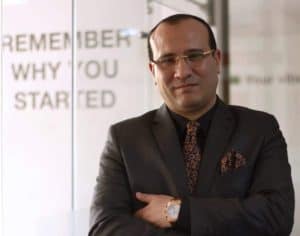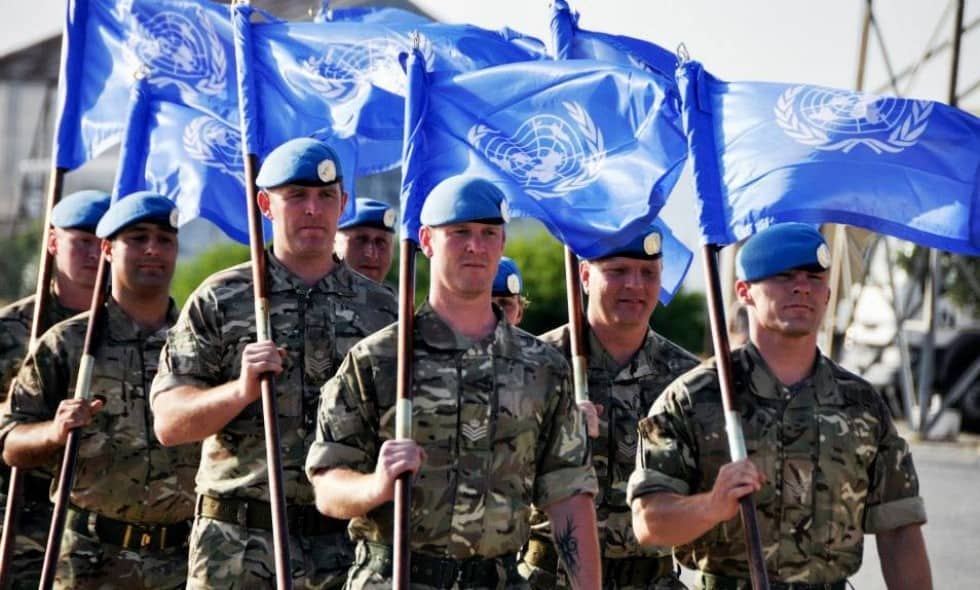Interview with Anas Alqassas – The United Nations is currently positioning itself as a leading international organization providing cloud solutions for managing geopolitical risks. The influence of the UN on the global alignment of forces, according to a number of experts, is a manifestation of best peacekeeping practice for the entire international community, lobbying groups interested in resolving existing crises. However, UN critics argue that the organization has long lost its independent status and has become a tool to legitimize the decisions of certain superpowers, while the organization itself has no influence.
Specifically for World Geostrategic Insights, Denis Korkodinov talked about this with Anas Alqassas, a former military analyst and United Nations foreign affairs specialist.
 1. The United Nations Disarmament Commission, at the request of Russia, announced the forced postponement of the organizational session of 2020 for 10 days due to the fact that the United States did not issue a visa to the head of the Russian delegation Konstantin Vorontsov. As a result, the work of the international commission was actually disrupted. Does this indicate that the United States decided to block the United Nations disarmament activities? The need for a meeting of the UN Disarmament Commission was caused, first of all, by violations by a number of regional players of the international arms embargo on conflict zones and, in particular, in Libya. However, the blocking of the commission’s activities by the United States suggests that Washington is not interested in ensuring that the international arms embargo is respected or that Russia becomes part of this process. What were the true intentions of the United States, which refused to issue a visa to the head of the Russian delegation, Konstantin Vorontsov?
1. The United Nations Disarmament Commission, at the request of Russia, announced the forced postponement of the organizational session of 2020 for 10 days due to the fact that the United States did not issue a visa to the head of the Russian delegation Konstantin Vorontsov. As a result, the work of the international commission was actually disrupted. Does this indicate that the United States decided to block the United Nations disarmament activities? The need for a meeting of the UN Disarmament Commission was caused, first of all, by violations by a number of regional players of the international arms embargo on conflict zones and, in particular, in Libya. However, the blocking of the commission’s activities by the United States suggests that Washington is not interested in ensuring that the international arms embargo is respected or that Russia becomes part of this process. What were the true intentions of the United States, which refused to issue a visa to the head of the Russian delegation, Konstantin Vorontsov?
ANAS ALQASSAS: The United States is the most needy country in the UN, with international legitimacy and unanimity to organize discussions on such a sensitive topic as disarmament. In this regard, Washington is clearly against violating the arms embargo against Libya or any other country because of the detrimental effects on the security of North Africa, the Sahel and sub-Saharan Africa. This position has been well demonstrated in the activities and statements of US AFRICOM over the past three years.
The Donald Trump administration may take a maneuver to maintain the liquidity of armaments in Libya for a while, based on a promise to regional allies to put an end to Libyan chaos before the next US election, but this is not the White House’s strategic line at this time.
Regarding the adjournment of the Commission meeting, it is important to note that this is not the first time that meetings are adjourned due to procedural issues such as visas and the financial crisis. All these actions are undertaken by the United States in many influential UN apparatuses to confirm Washington’s hegemony with respect to the UN system. In turn, some UN agencies with headquarters in Europe declare their disobedience, for example, the International Criminal Court and UNESCO, but the United States easily ignores this resistance through financial manipulation.
The refusal to issue a visa to the head of the Russian delegation, Konstantin Vorontsov, is a procedural issue and has nothing to do with official Russian politics in the international arena. Therefore, it is a mistake to perceive here any manifestations of discrimination against Moscow.
2. On February 11, 2020, the UN Security Council held a meeting on Middle East settlement, during which it was decided to extend sanctions against Libya, including the arms embargo, and a ban on the import and export of petroleum products. For this decision voted 14 countries. However, in this story, the duration of the UN Security Council meeting is surprising. So, according to the official report published on the website of the international organization, the meeting began at 15:17 hours and ended at 15:22 local time, that is, its actual duration was exactly 5 minutes. Does this mean that the meeting of the Security Council, in which the fate of Libya was decided, was only a formality, while all decisions on Libya were already taken in advance? Why did Russia refrain from adopting a resolution on Libya? In the process of adoption by the UN Security Council, to what extent were the interests of the Libyan people taken into account?
ANAS ALQASSAS: This is not a secret in the international system after the Second World War. The United Nations is not an organization for the practical use of force, it is the mouthpiece of the international will of the club of superpowers, which is actually controlled by the operator of the most powerful military machine and the richest nation on earth today – the United States of America. This equation has governed the international system since the first Cold War debate on the Korean Peninsula in the late 1950s and remains valid to this day. All decisions of international legitimacy since the founding of the United Nations, one way or another, are a manifestation of the internal balance within this club. Moreover, their regional allies from time to time play a very limited role in accordance with the nature of the conflict. According to these conditions, the most important UN Security Council resolutions are discussed behind the scenes before going to unanimous meetings.
Thus, the time of the UN Security Council sessions is a less significant issue for resolution.
As for the position of Russia, which refrained from recognizing the UN Security Council resolution on Libya, its decision was influenced by the ignoring by the international organization of Russian interests proper, which were expressed with the need to maintain parity between all parties to the Libyan conflict. And since the UN Security Council, in its resolution, did not aim to emphasize a balance of power between the Libyan National Army and the Government of National Accord, Moscow could not agree to this.
The interests of the Libyan people are determined taking into account local specifics and are implemented at the national level. In turn, the UN Security Council resolution is only a framework document that needs to be worked out in detail directly in Libya. And for this reason, the people through their official representatives can make adjustments to the international decision and has the right to completely ignore such a decision.
3. Concerned about the rapid deterioration of the humanitarian situation in the Syrian province of Idlib, and the tragic suffering of the civilian population, UN Secretary-General Antonio Guterres on February 18, 2020 called for an immediate ceasefire in the ongoing struggle in northwestern Syria. However, on February 19, Turkey, a member of the United Nations, announced a large-scale military operation in Idlib, which in fact will lead to another escalation of the conflict. In this regard, will there be any actions on the part of the United Nations that would have to restrain Turkey’s military operation in northwestern Syria?
ANAS ALQASSAS: The issue of Turkish intervention in the Syrian province of Idlib is a delicate and complex subject with extremely limited solutions in the near future.
The number of hostilities is very large, and the general basis for decisions and repeated negotiations is destroyed over time. Based on this, the UN expressed great concern and warned of catastrophic bloodshed in the area. However, there are currently no prospects for a UN-led solution to the Idlib problem due to a sharp split between key regional and international players in the Syrian conflict.
4. On February 17, 2020, UN Secretary-General Antonio Guterres officially announced that “the world must take a step forward and do more for Afghan refugees,” calling for greater solidarity and support in the context of one of the largest and longest refugee crises in the world. Does this indicate that the UN will strive in the near future to organize a negotiation process between the Taliban and the government of Ashraf Ghani in Kabul? What are the prospects for a solution to the Afghan crisis?
ANAS ALQASSAS: The Afghan crisis is closely linked to the country’s political status and security. Meanwhile, if the political deal and security agreement between the US administration and the Taliban continue, it will gradually put an end to the refugee crisis. Although this deal will not put an end to all the problems that have accumulated over two decades between the government of official Kabuoa and the Taliban, this step will be the right way to decipher this crisis. In this context, any UN-led negotiations between the Taliban and the Kabul government or provincial councils are considered successful. An agreement between the United States and the Taliban is a prerequisite for these local agreements.
5) The conflict in Afghanistan directly affects the interests of Pakistan and India, which are in dispute over the status of Kashmir. Based on this, it is logical to assume that the resolution of the Afghan problem is impossible without the resolution of the Indo-Pakistan dispute. Is it really?
ANAS ALQASSAS: To my knowledge, this is not an accurate judgment. Yes, the Afghan crisis is connected with the Pakistani status quo, but this does not mean that it is directly affected by the centrifugal Indo-Pakistani conflict. This is closer to the interaction between Pakistan, Iran and China than to India and Pakistan.
India, headed by the government of Narendra Modi, is already a powerful player in the geopolitics of Central Asia, but, nevertheless, is still inferior there to the interests of Pakistan and Iran because of the Islamic structure of Central Asia. And Russia faced this problem in the cold season.
Thus, India’s attempts to weave convergence with China over cross-border radicalism in Central Asia and, in particular, on the Afghan issue, are always weaker than that of Pakistan and Iran. That is why India is resorting to a US ally to find a trace in Afghanistan.
Be that as it may, the conflict between Islamabad and New Delhi has become one of the most important Trojan horses of the international system. And any attempt to manipulate this conflict for any regional or international purpose can lead to a big explosion in the international order. The United Nations influences the alignment of forces in the region and tries to prevent the escalation of the conflict. And the UN peacekeeping role, in this case, is very large.







